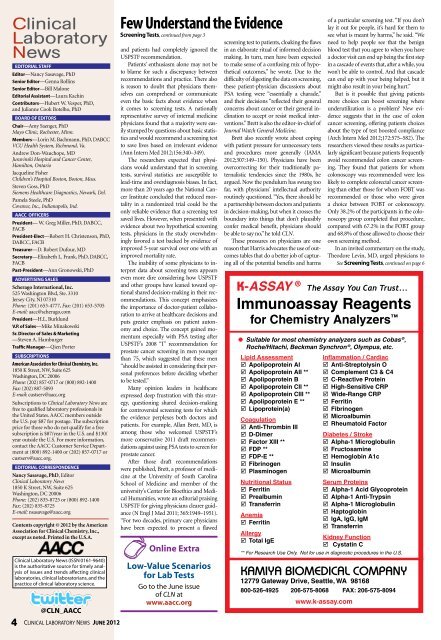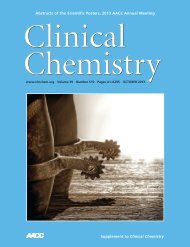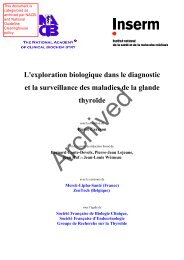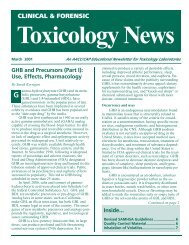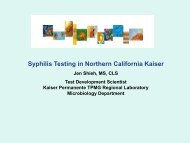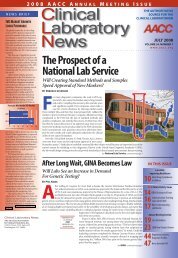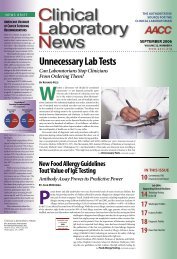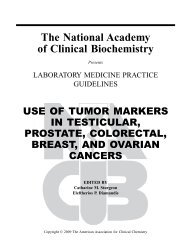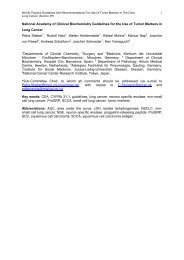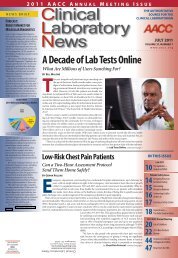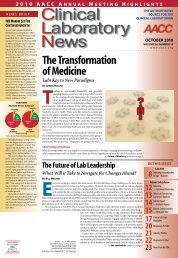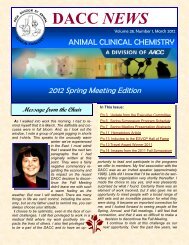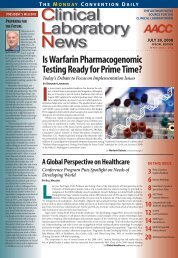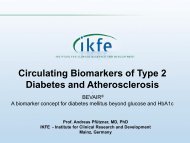June 2012 - American Association for Clinical Chemistry
June 2012 - American Association for Clinical Chemistry
June 2012 - American Association for Clinical Chemistry
Create successful ePaper yourself
Turn your PDF publications into a flip-book with our unique Google optimized e-Paper software.
<strong>Clinical</strong><br />
Laboratory<br />
News<br />
eDiTorial sTaff<br />
editor—Nancy Sasavage, PhD<br />
senior editor—Genna Rollins<br />
senior editor—Bill Malone<br />
editorial assistant—Laura Kachin<br />
contributors—Hubert W. Vesper, PhD,<br />
and Julianne Cook Botelho, PhD<br />
boarD of eDiTors<br />
chair—Amy Saenger, PhD<br />
Mayo Clinic, Rochester, Minn.<br />
members—Lorin M. Bachmann, PhD, DABCC<br />
VCU Health System, Richmond, Va.<br />
Andrew Don-Wauchope, MD<br />
Juravinski Hospital and Cancer Center,<br />
Hamilton, Ontario<br />
Jacqueline Fisher<br />
Children’s Hospital Boston, Boston, Mass.<br />
Steven Goss, PhD<br />
Siemens Healthcare Diagnostics, Newark, Del.<br />
Pamela Steele, PhD<br />
Covance, Inc., Indianapolis, Ind.<br />
aacc officers<br />
President— W. Greg Miller, PhD, DABCC,<br />
FACB<br />
President-elect—Robert H. Christenson, PhD,<br />
DABCC, FACB<br />
Treasurer—D. Robert Dufour, MD<br />
secretary—Elizabeth L. Frank, PhD, DABCC,<br />
FACB<br />
Past-President—Ann Gronowski, PhD<br />
aDverTising sales<br />
Scherago International, Inc.<br />
525 Washington Blvd, Ste. 3310<br />
Jersey City, NJ 07310<br />
Phone: (201) 653-4777, Fax: (201) 653-5705<br />
E-mail: aacc@scherago.com<br />
President—H.L. Burklund<br />
v.P. of sales—Mike Minakowski<br />
sr. Director of sales & marketing<br />
—Steven A. Hamburger<br />
Traffic manager—Qien Porter<br />
subscriPTions<br />
<strong>American</strong> <strong>Association</strong> <strong>for</strong> <strong>Clinical</strong> <strong>Chemistry</strong>, Inc.<br />
1850 K Street, NW, Suite 625<br />
Washington, DC 20006<br />
Phone: (202) 857-0717 or (800) 892-1400<br />
Fax: (202) 887-5093<br />
E-mail: custserv@aacc.org<br />
Subscriptions to <strong>Clinical</strong> Laboratory News are<br />
free to qualified laboratory professionals in<br />
the United States. AACC members outside<br />
the U.S. pay $87 <strong>for</strong> postage. The subscription<br />
price <strong>for</strong> those who do not qualify <strong>for</strong> a free<br />
subscription is $87/year in the U.S. and $130/<br />
year outside the U.S. For more in<strong>for</strong>mation,<br />
contact the AACC Customer Service Department<br />
at (800) 892-1400 or (202) 857-0717 or<br />
custserv@aacc.org.<br />
eDiTorial corresPonDence<br />
Nancy Sasavage, PhD, Editor<br />
<strong>Clinical</strong> Laboratory News<br />
1850 K Street, NW, Suite 625<br />
Washington, DC 20006<br />
Phone: (202) 835-8725 or (800) 892-1400<br />
Fax: (202) 835-8725<br />
E-mail: nsasavage@aacc.org<br />
Contents copyright © <strong>2012</strong> by the <strong>American</strong><br />
<strong>Association</strong> <strong>for</strong> <strong>Clinical</strong> <strong>Chemistry</strong>, Inc.,<br />
except as noted. Printed in the U.S.A.<br />
<strong>Clinical</strong> laboratory news (issn 0161-9640)<br />
is the authoritative source <strong>for</strong> timely analysis<br />
of issues and trends affecting clinical<br />
laboratories, clinical laboratorians, and the<br />
practice of clinical laboratory science.<br />
@cln_aacc<br />
4 CliniCal laboratory news <strong>June</strong> <strong>2012</strong><br />
Few Understand the Evidence<br />
screening Tests, continued from page 3<br />
and patients had completely ignored the<br />
USPSTF recommendation.<br />
Patients’ enthusiasm alone may not be<br />
to blame <strong>for</strong> such a discrepancy between<br />
recommendations and practice. There also<br />
is reason to doubt that physicians themselves<br />
can comprehend or communicate<br />
even the basic facts about evidence when<br />
it comes to screening tests. A nationally<br />
representative survey of internal medicine<br />
physicians found that a majority were easily<br />
stumped by questions about basic statistics<br />
and would recommend a screening test<br />
to save lives based on irrelevant evidence<br />
(Ann Intern Med <strong>2012</strong>;156:340–349).<br />
The researchers expected that physicians<br />
would understand that in screening<br />
tests, survival statistics are susceptible to<br />
lead-time and overdiagnosis biases. In fact,<br />
more than 20 years ago the National Cancer<br />
Institute concluded that reduced mortality<br />
in a randomized trial could be the<br />
only reliable evidence that a screening test<br />
saved lives. However, when presented with<br />
evidence about two hypothetical screening<br />
tests, physicians in the study overwhelmingly<br />
favored a test backed by evidence of<br />
improved 5-year survival over one with an<br />
improved mortality rate.<br />
The inability of some physicians to interpret<br />
data about screening tests appears<br />
even more dire considering how USPSTF<br />
and other groups have leaned toward optional<br />
shared decision-making in their recommendations.<br />
This concept emphasizes<br />
the importance of doctor-patient collaboration<br />
to arrive at healthcare decisions and<br />
puts greater emphasis on patient autonomy<br />
and choice. The concept gained momentum<br />
especially with PSA testing after<br />
USPSTF’s 2008 “I” recommendation <strong>for</strong><br />
prostate cancer screening in men younger<br />
than 75, which suggested that these men<br />
“should be assisted in considering their personal<br />
preferences be<strong>for</strong>e deciding whether<br />
to be tested.”<br />
Many opinion leaders in healthcare<br />
expressed deep frustration with this strategy,<br />
questioning shared decision-making<br />
<strong>for</strong> controversial screening tests <strong>for</strong> which<br />
the evidence perplexes both doctors and<br />
patients. For example, Allan Brett, MD, is<br />
among those who welcomed USPSTF’s<br />
more conservative 2011 draft recommendations<br />
against using PSA tests to screen <strong>for</strong><br />
prostate cancer.<br />
After those draft recommendations<br />
were published, Brett, a professor of medicine<br />
at the University of South Carolina<br />
School of Medicine and member of the<br />
university’s Center <strong>for</strong> Bioethics and Medical<br />
Humanities, wrote an editorial praising<br />
USPSTF <strong>for</strong> giving physicians clearer guidance<br />
(N Engl J Med 2011; 365:1949–1951).<br />
“For two decades, primary care physicians<br />
have been expected to present a flawed<br />
online extra<br />
low-value scenarios<br />
<strong>for</strong> lab Tests<br />
go to the <strong>June</strong> issue<br />
of CLN at<br />
www.aacc.org<br />
screening test to patients, cloaking the flaws<br />
in an elaborate ritual of in<strong>for</strong>med decision<br />
making. In turn, men have been expected<br />
to make sense of a confusing mix of hypothetical<br />
outcomes,” he wrote. Due to the<br />
difficulty of digesting the data on screening,<br />
these patient-physician discussions about<br />
PSA testing were “essentially a charade,”<br />
and their decisions “reflected their general<br />
concerns about cancer or their general inclination<br />
to accept or resist medical interventions.”<br />
Brett is also the editor-in-chief of<br />
Journal Watch General Medicine.<br />
Brett also recently wrote about coping<br />
with patient pressure <strong>for</strong> unnecessary tests<br />
and procedures more generally (JAMA<br />
<strong>2012</strong>;307:149–150). Physicians have been<br />
overcorrecting <strong>for</strong> their traditionally paternalistic<br />
tendencies since the 1980s, he<br />
argued. Now the pendulum has swung too<br />
far, with physicians’ intellectual authority<br />
routinely questioned. “Yes, there should be<br />
a partnership between doctors and patients<br />
in decision-making, but when it crosses the<br />
boundary into things that don’t plausibly<br />
confer medical benefit, physicians should<br />
be able to say no,” he told CLN.<br />
These pressures on physicians are one<br />
reason that Harris advocates the use of outcomes<br />
tables that do a better job of capturing<br />
all of the potential benefits and harms<br />
of a particular screening test. “If you don’t<br />
lay it out <strong>for</strong> people, it’s hard <strong>for</strong> them to<br />
see what is meant by harms,” he said. “We<br />
need to help people see that the benign<br />
blood test that you agree to when you have<br />
a doctor visit can end up being the first step<br />
in a cascade of events that, after a while, you<br />
won’t be able to control. And that cascade<br />
can end up with your being helped, but it<br />
might also result in your being hurt.”<br />
But is it possible that giving patients<br />
more choices can boost screening where<br />
underutilization is a problem? New evidence<br />
suggests that in the case of colon<br />
cancer screening, offering patients choices<br />
about the type of test boosted compliance<br />
(Arch Intern Med <strong>2012</strong>;172:575–582). The<br />
researchers viewed these results as particularly<br />
significant because patients frequently<br />
avoid recommended colon cancer screening.<br />
They found that patients <strong>for</strong> whom<br />
colonoscopy was recommended were less<br />
likely to complete colorectal cancer screening<br />
than either those <strong>for</strong> whom FOBT was<br />
recommended or those who were given<br />
a choice between FOBT or colonoscopy.<br />
Only 38.2% of the participants in the colonoscopy<br />
group completed that procedure,<br />
compared with 67.2% in the FOBT group<br />
and 68.8% of those allowed to choose their<br />
own screening method.<br />
In an invited commentary on the study,<br />
Theodore Levin, MD, urged physicians to<br />
See screening Tests, continued on page 6<br />
Immunoassay Reagents<br />
<strong>for</strong> <strong>Chemistry</strong> Analyzers K-ASSAY The Assay You Can Trust...<br />
®<br />
Suitable <strong>for</strong> most chemistry analyzers such as Cobas ® ,<br />
Roche/Hitachi, Beckman Synchron ® , Olympus, etc.<br />
Lipid Assessment<br />
Apolipoprotein AI<br />
Apolipoprotein AII **<br />
Apolipoprotein B<br />
Apolipoprotein CII **<br />
Apolipoprotein CIII **<br />
Apolipoprotein E **<br />
Lipoprotein(a)<br />
Coagulation<br />
Anti-Thrombin III<br />
D-Dimer<br />
Factor XIII **<br />
FDP **<br />
FDP-E **<br />
Fibrinogen<br />
Plasminogen<br />
Nutritional Status<br />
Ferritin<br />
Prealbumin<br />
Transferrin<br />
Anemia<br />
Ferritin<br />
Allergy<br />
Total IgE<br />
Inflammation / Cardiac<br />
Anti-Streptolysin O<br />
Complement C3 & C4<br />
C-Reactive Protein<br />
High-Sensitive CRP<br />
Wide-Range CRP<br />
Ferritin<br />
Fibrinogen<br />
Microalbumin<br />
Rheumatoid Factor<br />
Diabetes / Stroke<br />
Alpha-1 Microglobulin<br />
Fructosamine<br />
Hemoglobin A1c<br />
Insulin<br />
Microalbumin<br />
Serum Proteins<br />
Alpha-1 Acid Glycoprotein<br />
Alpha-1 Anti-Trypsin<br />
Alpha-1 Microglobulin<br />
Haptoglobin<br />
IgA, IgG, IgM<br />
Transferrin<br />
Kidney Function<br />
Cystatin C<br />
** For Research Use Only. Not <strong>for</strong> use in diagnostic procedures in the U.S.<br />
KAMIYA BIOMEDICAL COMPANY<br />
12779 Gateway Drive, Seattle, WA 98168<br />
800-526-4925 206-575-8068 FAX: 206-575-8094<br />
www.k-assay.com<br />
2011.09 CLN Immunoassay.indd 1 8/5/2011 5:05:28 PM


